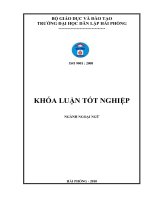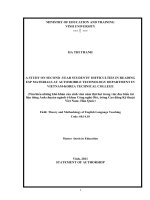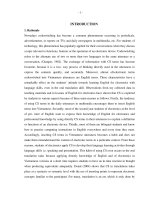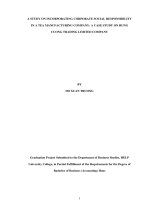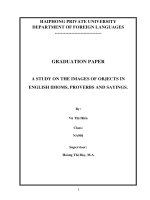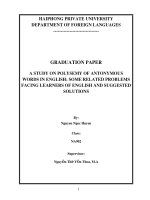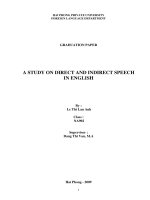A study on second-year navigation students' difficulties in learning ESP vocabulary at Haiphong Poli-technical College
Bạn đang xem bản rút gọn của tài liệu. Xem và tải ngay bản đầy đủ của tài liệu tại đây (196.94 KB, 5 trang )
1
VIETNAM NATIONAL UNIVERSITY, HANOI
UNIVERSITY OF LANGUAGES AND INTERNATIONAL STUDIES
FACULTY OF POST-GRADUATE STUDIES
TRẦN THÁI SƠN
A STUDY ON SECOND-YEAR NAVIGATION STUDENTS’
Difficulties IN LEARNING ESP Vocabulary at
Haiphong poly-technical college
(NGHIÊN CỨU NHỮNG KHÓ KHĂN TRONG VIỆC HỌC TỪ VỰNG
TIẾNG ANH CHUYÊN NGÀNH CỦA SINH VIÊN NĂM THỨ HAI
NGÀNH ĐIỀU KHIỂN TÀU BIỂN TẠI TRƯỜNG CAO ĐẲNG NGHỀ
BÁCH NGHỆ HẢI PHÒNG)
M.A. MINOR THESIS
FIELD: ENGLISH METHODOLOGY
CODE: 601410
HANOI - 2010
2
VIETNAM NATIONAL UNIVERSITY, HANOI
UNIVERSITY OF LANGUAGES AND INTERNATIONAL STUDIES
FACULTY OF POST-GRADUATE STUDIES
TRẦN THÁI SƠN
A STUDY ON SECOND-YEAR NAVIGATION STUDENTS’
Difficulties IN LEARNING ESP Vocabulary at
Haiphong poly-technical college
(NGHIÊN CỨU NHỮNG KHÓ KHĂN TRONG VIỆC HỌC TỪ
VỰNG TIẾNG ANH CHUYÊN NGÀNH CỦA SINH VIÊN NĂM THỨ
HAI NGÀNH ĐIỀU KHIỂN TÀU BIỂN TẠI TRƯỜNG CAO ĐẲNG
NGHỀ BÁCH NGHỆ HẢI PHÒNG)
M.A. MINOR THESIS
FIELD: ENGLISH METHODOLOGY
CODE: 601410
SUPERVISOR: MAI THỊ LOAN, M.A.
HANOI- 2010
6
TABLE OF CONTENTS
Page
Declaration of originality
i
Acknowledgement
ii
Abstract
iii
Table of contents
iv
List of abbreviations
vii
List of tables and charts
viii
Part 1: Introduction
1
1. Rationale of the study
1
2. Aims of the study
2
3. Scope of the study
2
4. Methods of the study
2
5. Significance of the study
3
6. Design of the study
3
Part 2: Development
4
Chapter 1: Literature review
4
1.1. English for Special Purposes
4
1.1.1. Definition of ESP
4
1.1.2. Classification of ESP
5
1.1.3. Maritime English
6
1.1.4. The requirements for ESP teachers
6
1.2. Terminology
7
1.2.1. Definition of terminology
7
1.2.2. Characteristics of terminology
8
1.3. Vocabulary
8
1.3.1. Definition of words
8
1.3.2. Classification of words
9
1.3.3. Four strands in learning vocabulary
9
1.4. Factors affecting vocabulary acquisition
10
1.4.1. Learner styles and learner strategies
10
7
1.4.2. Materials
11
1.4.3. Pronunciation and spelling
12
1.4.4. Prototypes
12
1.4.5. Contextualization
13
1.4.6. Learner autonomy
13
1.5. Strategies to enhance students‟ vocabulary
14
1.5.1. Developing a variety of techniques for the teaching of meaning
14
1.5.2. Encouraging the development of effective strategies
14
1.5.3. Exposing learners to vocabulary through reading and training lexical
inferencing
14
1.5.4. Teaching the effective use of dictionaries
14
1.5.5. Evaluating the vocabulary component of course books
15
1.5.6. Teaching vocabulary explicitly through a range of activity types
15
1.5.7. Developing resources for vocabulary teaching
15
1.6. Summary
15
Chapter 2: Methodology
16
2.1. Context of the study
16
2.2. Research question
16
2.3. Subjects of the study
17
2.4. Data collection instruments
17
2.4.1. Questionnaire
17
2.4.2. Test
17
2.4.3. Interview
18
2.5. Data collection procedure
18
Chapter 3: Data analysis, major findings and suggested solutions
19
3.1. Data analysis
19
3.1.1. Questionnaire
19
3.1.2. Test
26
3.1.3. Interview
30
3.2. Major findings
32
3.2.1. Lack of necessary GE knowledge
32
8
3.2.2. ESP vocabulary pronunciation and meanings
32
3.2.3. Inappropriate materials
32
3.2.4. Lack of effective strategies for learning ESP vocabulary
33
3.2.5. Difficulties in teaching ESP words
33
3.2.6. Lack of learner autonomy
33
3.3. Suggested solutions
34
3.3.1. Enhancing the necessary GE knowledge
34
3.3.2. Developing resources for ESP vocabulary teaching and learning
34
3.3.3. Encouraging the development of effective vocabulary learning strategies
35
3.3.4. Developing the effective ESP vocabulary teaching
36
3.3.5. Encouraging students to form their learning autonomy
36
Part 3: Conclusion
37
1. Summary of the study
37
2. Limitations of the study
38
3. Suggestions for further study
38
References
39
Appendices
I
Appendix 1: Questionnaire
I
Appendix 2: Test
IV
Appendix 3: Answer keys to the test
VII
Appendix 4: Interview questions for ESP teachers
VIII

